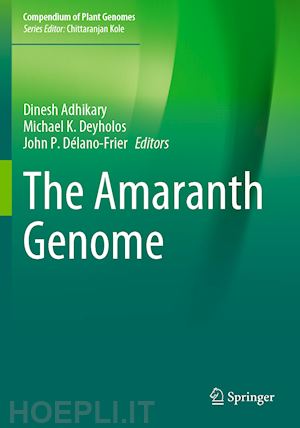
Questo prodotto usufruisce delle SPEDIZIONI GRATIS
selezionando l'opzione Corriere Veloce in fase di ordine.
Pagabile anche con Carta della cultura giovani e del merito, 18App Bonus Cultura e Carta del Docente
This book describes the development of genetic resources in amaranths, with a major focus on genomics, reverse, and forward genetics tools and strategies that have been developed for crop improvement. Amaranth is an ancient crop native to the New World. Interest in amaranths is being renewed, due to their adaptability, stress tolerance, and nutritional value. There are about 65 species in the genus, including Amaranthus caudatus L., A. cruentus L., and A. hypochondriacus L., which are primarily grown as protein-rich grains or pseudocereals. The genus also includes major noxious weeds (e.g., A. palmeri). The amaranths are within the Caryophyllales order and thus many species (e.g., A. tricolor) produce red (betacyanin) or yellow (betaxanthin) betalain pigments, which are chemically distinct from the anthocyanins responsible for red pigmentation in other plants. A. hypochondriacus, which shows disomic inheritance (2n = 32; n= 466 Mb), has been sequenced and annotated with 23,059 protein-coding genes. Additional members of the genus are now also been sequenced including weedy amaranths, other grain amaranths, and their putative progenitors.
Dr. Dinesh Adhikary holds a Ph.D. in Biology from the University of British Columbia, a M.S. in Plant Biology from Stephen F. Austin State University, and a B.S. in Genetics and Biotechnology from Brigham Young University, Utah. Dr. Adhikary's doctoral work focused on the development of genetic resources and functional analysis of betalains in amaranths. He developed the first major catalog of amaranth genes by assembling transcriptomes of A. hypochondriacus cv. Plainsman. He established the reverse genetics tool for amaranths, using virus-induced gene silencing (VIGS) and characterized the betalain biosynthesis pathway in A. tricolor. Additionally, he has contributed to morphologic and taxonomic analysis of the weedy and cultivated Amaranthus hybridus species complex.
Dr. Michael Deyholos holds a B.Sc. in Genetics from the University of Alberta, and a Ph.D. in Plant Molecular Biology from McGill University. His doctoral dissertation focused on the developmental genetics of the plant vascular system. Subsequently, he completed postdoctoral studies on abiotic stress genomics at the University of Arizona. Following 12 years as a faculty member of the Department of Biological Sciences at the University of Alberta, he moved to the University of British Columbia, where he is currently Professor and Head of Biology. He has continued his use of whole genome sequencing, transcriptome, and proteome analysis to study relationships between the cell wall, pathogens, and small metabolites in plants. His laboratory was a major contributor to the sequencing and annotation of the genomes of flax, amaranth, and other vascular plants. He was also a major contributor to the One Thousands Plants project.
Dr. John Délano-Frier got his B.Sc. in Food Biochemistry and Engineering at the Instituto Tecnológico y de Estudios Superiors de Monterrey, in Mexico, his M.Sc. in Food Science, with Distinction, at The University of Reading, in England, and his Ph.D. at Washington State University under the supervision of Dr. Ryan. His doctoral dissertation was centered on the role of systemin and prosystemin, the first bioactive peptide reported and its protein precursor, respectively, in biotic stress response regulation. He is now a Research Professor at Cinvestav, at Irapuato. Here, he has continued to research systemin and related peptides, not only as regulators of defense response but also of mutualistic relationships with beneficial microorganisms, such as non-pathogenic bacteria and mycorrhizal fungi. He has also concentrated on the study of biotic responses in grain amaranth, and his group has recently developed a reliable method to genetically transform grain amaranth roots, from which transgenic amaranth plants can be regenerated. He is also interested in defining the role of transcriptionally restricted genes in the regulation of stress responses and/or development processes.











Il sito utilizza cookie ed altri strumenti di tracciamento che raccolgono informazioni dal dispositivo dell’utente. Oltre ai cookie tecnici ed analitici aggregati, strettamente necessari per il funzionamento di questo sito web, previo consenso dell’utente possono essere installati cookie di profilazione e marketing e cookie dei social media. Cliccando su “Accetto tutti i cookie” saranno attivate tutte le categorie di cookie. Per accettare solo deterninate categorie di cookie, cliccare invece su “Impostazioni cookie”. Chiudendo il banner o continuando a navigare saranno installati solo cookie tecnici. Per maggiori dettagli, consultare la Cookie Policy.